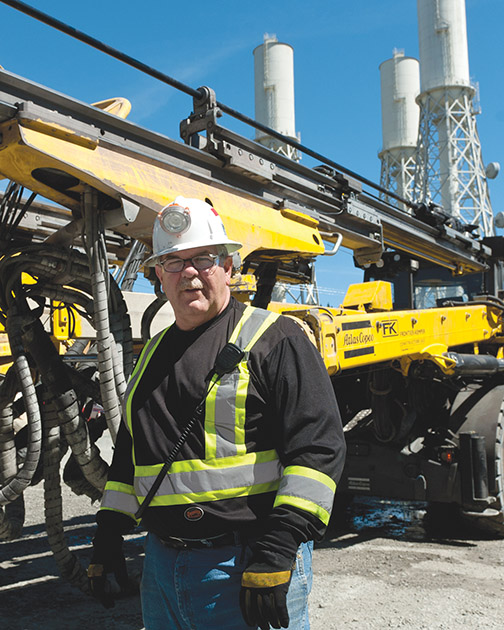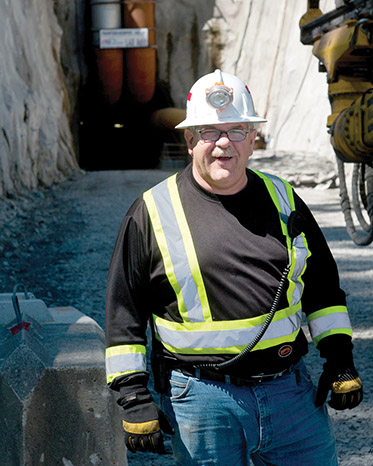After nearly 20 years of working underground, to depths as far as 7,000 feet, Bob Shelley took a break to work on an offshore drilling rig for a couple years.
The first day on the job, he was asked to go 150 feet into the air on a rope hoist to perform a hydraulic repair.
“I said, ‘Sure,'” said Shelley. “But I said, ‘Hey man, if you don’t mind, take me up 40 or 50 feet, let me come down, I’ll shake it off and you can take me back up.’
“He said, ‘What do you mean? You scared of heights?’ I said, ‘I don’t know. Never been up.'”
Shelley is safely back on solid ground — and occasionally beneath it — as master mechanic for Frontier-Kemper, the subcontractor leading the controlled blasting and mining portion of the John Hart project in Campbell River.
Originally from Newfoundland, Shelley, 58, and his wife, Wendy, have crisscrossed Canada and the globe on work projects that often have them living in a new home — or country — for a year or more at a time.
And, while he may move on again to another job after excavation is completed on the John Hart project, Shelley insists he hasn’t seen the last of Vancouver Island.
“We’ve had 26 addresses, and this is the best spot,” said Shelley, who moved here with Wendy from their more-or-less permanent home in Edmonton. “Two months after we got here, she said, ‘Why would we ever leave here?’ Of all the places in the world, this is the best spot we’ve ever lived in, right here. Unbelievable. You’ve got everything.”
And it has always been a team project for Bob and Wendy. Whenever he is set for a new job posting, whether in Ontario, Malaysia, South America or the Gobi Desert, Wendy paves the way with meticulous research.
“When my wife goes somewhere, she studies everything about it,” Shelley said. “She knows more about this place than most people here. She knew more about Malaysia than the locals. She knew more about Mongolia than the locals.
“She goes out, she meets the newcomers’ club. She’s the president of the Newcomers’ Club, here in town.”
Already, Shelley claims he and his wife have decided to retire on Vancouver Island when they’re finished globetrotting for his work.
And why not, when you consider some of the alternatives.
Everyone who has worked in mining as long as Shelley has lost friends in accidents. But he has also had what seems to be more than his share of adventure and danger away from the job site.
Shelley was on the northern tip of Sumatra on Boxing Day of 2004 when a huge tsunami that followed the Sumatra-Andaman earthquake killed 230,000 people in 14 countries, including a number of his friends or their families.
In 2010, Shelley and his wife were in Chile when an 8.8-magnitude earthquake struck off the coast. At that time, before the 2011 megaquake off Japan, it was the fifth-largest earthquake ever recorded by seismograph.
“Me and my wife were on the ninth floor of a 20-storey building,” said Shelley. “She was going, man. The walls were cracking; the windows were busting. That was different.”
Perhaps the most extreme situation he found himself in was the rioting in Jakarta, Indonesia in May, 1998, which followed the shooting of four protesting students by security forces of President Suharto in the days before his forced resignation.
After going out for a drink, he was returning to his hotel in a taxi when he and his driver came upon a line of riot police right in front of the hotel.
“All of a sudden I see the backs of the riot police shooting that way, away from me, and the Molotov cocktails coming this way, towards me.”
After an uneasy night in the hotel, Shelley went to the desk to check out and go to the airport. He was informed the mobs were hijacking cars and that he’d never make it. At one point, he and other guests wer e hustled into a windowless basement room, which was literally barricaded with furniture, for more than a half hour before security forces secured the hotel.
e hustled into a windowless basement room, which was literally barricaded with furniture, for more than a half hour before security forces secured the hotel.
Those are some of the extremes, he admits, and “there was a lot of stuff like that.” But in all his travels, in all corners of the world, he has observed a common thread that runs through every culture.
“All over the world, everywhere you go, in the middle of Borneo, in the jungle; down the middle of Vancouver, in Hong Kong, Bangkok; everybody wants the same thing. They want to get up in the morning, they want to have a half-decent day, they want to feel they achieved something, and they want to go home to their family in the evening.”
And every time he leaves one of those communities after completing a major work project, Shelley does feel that sense of achievement. But it’s not a personal pride.
“It’s such a good feeling that we are part of that success; that we contributed to it,” he said. “But generally I think of it as a team doing it; I don’t think of it as me. I was a part of that team. We did it.”